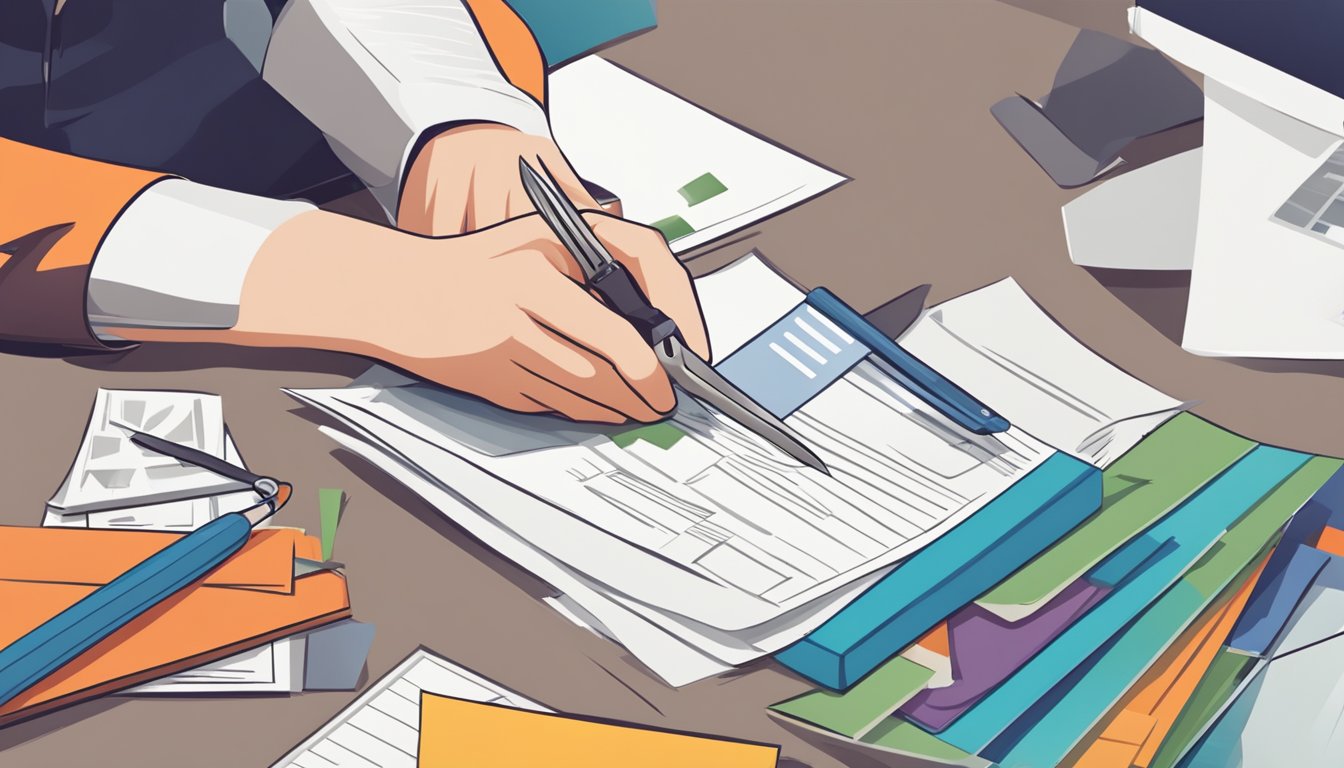Getting a personal loan in Singapore can be a great way to fund your financial needs, but what happens when you find yourself unable to repay the loan? Whether it’s due to unexpected financial circumstances or simply poor planning, being unable to repay your personal loan can be a stressful and overwhelming experience. However, there are ways to get out of a personal loan in Singapore and avoid further financial trouble.

Firstly, it’s important to understand the terms and conditions of your personal loan. This includes the interest rate, repayment period, and any penalties for early repayment or late payments. Knowing these details can help you make informed decisions about how to manage your loan.
If you’re struggling to repay your personal loan, there are several strategies you can use to improve your situation. These include negotiating with your lender for a repayment plan, seeking financial counselling, or even considering debt consolidation. By taking proactive steps to manage your loan, you can avoid defaulting on your payments and damaging your credit score.
Key Takeaways
- Understanding the terms and conditions of your personal loan is crucial for managing your debt effectively.
- If you’re struggling to repay your loan, there are several strategies you can use to improve your situation, including negotiating with your lender and seeking financial counselling.
- By taking proactive steps to manage your loan, you can avoid defaulting on your payments and damaging your credit score.
Understanding Personal Loans in Singapore

If you are in need of funds for a personal expense, a personal loan may be the solution for you. Personal loans are a type of unsecured loan that can be used for various purposes such as home renovation, medical bills, or even a dream vacation. In Singapore, there are several types of personal loans available, each with its own set of eligibility criteria, interest rates, and fees.
Types of Personal Loans
The most common types of personal loans in Singapore are term loans, balance transfer loans, and debt consolidation loans. A term loan is a type of loan that is repaid over a fixed period of time with a fixed interest rate. A balance transfer loan allows you to transfer your outstanding credit card balance to a personal loan with a lower interest rate. A debt consolidation loan combines all your outstanding debts into one loan with a lower interest rate.
Eligibility Criteria for Personal Loans
To be eligible for a personal loan in Singapore, you must be a Singaporean citizen or permanent resident, between 21 and 65 years old, and have a minimum annual income of $20,000. Your credit score will also be taken into consideration by the lender. A good credit score can increase your chances of being approved for a personal loan and may also result in a lower interest rate.
Interest Rates and Fees Explained
Personal loan interest rates in Singapore are typically calculated using the Effective Interest Rate (EIR). The EIR takes into account the interest rate, processing fee, and any other fees associated with the loan. It is important to compare the EIR of different personal loans to ensure that you are getting the best deal. Processing fees for personal loans are typically a percentage of the loan amount and can range from 1% to 4% of the loan amount.
In conclusion, personal loans can be a useful tool for financing personal expenses in Singapore. However, it is important to understand the different types of personal loans, eligibility criteria, and interest rates and fees associated with each loan before making a decision. By doing your research and comparing different personal loans, you can find the best loan for your needs and budget.
Navigating Loan Options

When it comes to getting out of a personal loan in Singapore, you have two main options: banks and licensed moneylenders. Each option has its own advantages and disadvantages, so it’s important to compare loan products and providers before making a decision.
Banks Versus Licensed Moneylenders
Banks are financial institutions that offer a wide range of loan products, including personal loans. They are often seen as a more reliable option than licensed moneylenders, as they are regulated by the Monetary Authority of Singapore (MAS) and have strict lending criteria.
On the other hand, licensed moneylenders are private companies that offer loans to individuals who may not meet the strict lending criteria of banks. They are regulated by the Ministry of Law and have more flexible lending criteria, but often charge higher interest rates.
Comparing Loan Products
When comparing loan products, it’s important to consider factors such as interest rates, loan amounts, repayment periods, and any additional fees or charges. Some popular personal loan providers in Singapore include UOB Personal Loan, Standard Chartered CashOne, and Citibank Quick Cash.
UOB Personal Loan offers loan amounts of up to $200,000 with a repayment period of up to 5 years. Standard Chartered CashOne offers loan amounts of up to 4 times your monthly salary with a repayment period of up to 5 years. Citibank Quick Cash offers loan amounts of up to $100,000 with a repayment period of up to 5 years.
Ultimately, the best loan product and provider for you will depend on your individual financial situation and needs. It’s important to do your research and compare loan products and providers before making a decision.
Strategies for Loan Approval

When it comes to taking out a personal loan in Singapore, getting approved can be a daunting task. However, there are several strategies you can use to increase your chances of approval.
Improving Your Credit Score
Your credit score is one of the most important factors that lenders consider when evaluating your loan application. A high credit score indicates that you are a low-risk borrower, while a low credit score suggests that you may be a high-risk borrower.
To improve your credit score, you should pay your bills on time, keep your credit card balances low, and avoid applying for too many loans or credit cards at once. You can also check your credit report for errors and dispute any inaccuracies with the credit bureau.
Documentation for Loan Application
When you apply for a personal loan, you will need to provide documentation to support your application. The exact documents required may vary depending on the lender, but typically include:
- Proof of identity (e.g. NRIC or passport)
- Proof of income (e.g. payslips or tax returns)
- Proof of address (e.g. utility bills or tenancy agreement)
If you are self-employed, you may need to provide additional documentation such as business registration documents or financial statements. Permanent residents may also need to provide proof of their residency status.
By ensuring that you have all the necessary documentation and that it is accurate and up-to-date, you can increase your chances of approval for a personal loan in Singapore.
Remember, taking out a personal loan is a serious financial commitment, so it’s important to borrow only what you can afford to repay. With the right strategies and documentation, you can increase your chances of approval and secure the funds you need to achieve your financial goals.
Repaying Your Loan Efficiently

If you’ve taken out a personal loan in Singapore, you’ll need to repay it within a certain period. Repaying your loan efficiently is important to ensure that you don’t fall into debt and end up with a poor credit score. Here are some tips to help you repay your loan efficiently.
Choosing the Right Repayment Plan
When it comes to repaying your loan, it’s important to choose the right repayment plan that suits your financial situation. You’ll need to consider the monthly repayment amount, the repayment period, and the interest rate. If you’re struggling to make your monthly repayments, you may want to consider a debt consolidation plan. This will allow you to combine all your debts into one single monthly repayment, making it easier to manage your finances.
Managing Finances and Avoiding Debt
Managing your finances is crucial when it comes to repaying your loan efficiently. You’ll need to create a budget and stick to it to ensure that you have enough money to make your monthly repayments. You should also avoid taking on any unnecessary debt during the repayment period. This includes avoiding credit card debt and other types of loans.
To avoid falling into debt, it’s important to be disciplined with your spending. You should only spend money on essential items and avoid any unnecessary purchases. You should also consider increasing your income by taking on a part-time job or freelancing.
By following these tips, you’ll be able to repay your personal loan efficiently and avoid falling into debt. Remember to choose the right repayment plan, manage your finances, and avoid taking on unnecessary debt.
Alternatives to Personal Loans

If you are looking for alternatives to personal loans, there are several options available to you. Here are a few alternatives to consider:
Borrowing from Family and Friends
Borrowing from family and friends is a common alternative to personal loans. This option is ideal if you need a small amount of money and can repay it quickly. However, it is important to remember that borrowing from family and friends can strain relationships if you are unable to repay the loan.
When borrowing from family and friends, it is important to be clear about the terms of the loan. You should agree on a repayment schedule and stick to it. It is also a good idea to put the terms of the loan in writing to avoid any misunderstandings.
Using Credit Cards and Balance Transfers
Using credit cards and balance transfers can be a good alternative to personal loans if you need to borrow a small amount of money. Credit cards offer a convenient way to borrow money, and many credit cards offer cashback rewards or other benefits.
If you have a high-interest credit card balance, you may be able to transfer the balance to a card with a lower interest rate. This can help you save money on interest charges and pay off your debt faster.
However, it is important to remember that credit cards can have high-interest rates and fees. If you are unable to pay off your balance in full each month, you may end up paying more in interest charges than you would with a personal loan.
Overall, there are several alternatives to personal loans that you can consider. Borrowing from family and friends and using credit cards and balance transfers are just a few options. Be sure to compare the costs and benefits of each option before making a decision.
Frequently Asked Questions

What are the consequences of not repaying a personal loan in Singapore?
Not repaying a personal loan in Singapore can have serious consequences. You may face legal action, and your credit score will be affected. This can make it difficult for you to obtain credit in the future.
Is it possible to have a personal loan written off in Singapore, and if so, after how long?
It is not possible to have a personal loan written off in Singapore. Even if you are unable to make repayments, you will still be responsible for repaying the loan. However, you may be able to negotiate a debt settlement with your lender.
Can foreigners in Singapore face repercussions for unpaid credit card debt?
Yes, foreigners in Singapore can face repercussions for unpaid credit card debt. If you are unable to make repayments, your credit score will be affected, and you may face legal action. It is important to seek debt relief as soon as possible.
What options are available for debt relief in Singapore?
There are several options available for debt relief in Singapore, including debt consolidation, debt management plans, and bankruptcy. It is important to seek professional advice to determine which option is best for your situation.
How can one terminate a personal loan agreement early in Singapore?
To terminate a personal loan agreement early in Singapore, you will need to contact your lender and negotiate a settlement. You may be required to pay a penalty fee for early termination.
What is the process for applying for a credit card after a Debt Management Programme in Singapore?
After completing a Debt Management Programme in Singapore, you may be able to apply for a credit card. However, your credit score will have been affected by your previous debt, so it may be difficult to obtain credit. It is important to rebuild your credit score before applying for credit again.




